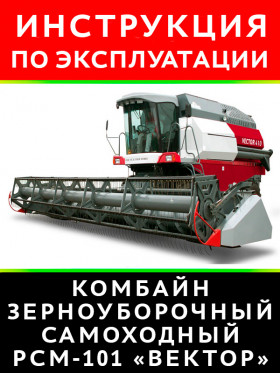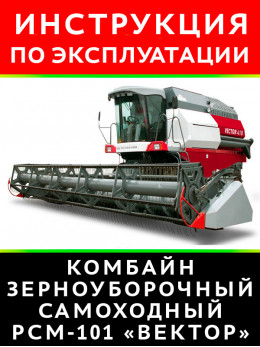RSM-101 VECTOR, owners e-manual (in Russian)
Only original manuals
Available immediately after payment
Full compliance with the paper edition
100% protection of your payments
Publisher: © "TechProsvet"
ISBN: 978-002-800-032-9
Number of pages: 176
Format: file PDF
About the manual
Engine type: diesel
In the manual you will find
- Instructions for repair of various vehicle components
- Information on self-service harvester
- Information on the design of the harvester and how to prevent failure
- The information for the trip to the service station, if the self-repair is impossible
Publisher:
TechProsvet
Categories:
Combine-harvesters
Only original manuals
Available immediately after payment
Full compliance with the paper edition
100% protection of your payments
Publisher: © "TechProsvet"
ISBN: 978-002-800-032-9
Number of pages: 176
Format: file PDF
About the manual
Engine type: diesel
In the manual you will find
- Instructions for repair of various vehicle components
- Information on self-service harvester
- Information on the design of the harvester and how to prevent failure
- The information for the trip to the service station, if the self-repair is impossible
Contents
Introduction
- General information
- Before starting
General description and technical characteristics
- Purpose and scope
- Combine equipment
- Design features
- Additional equipment
- Rating plates and serial numbers
- Brief information about the device of the combine
- Combine composition
- Direct combining technological process
- Technological process of picking up swaths by the pick-up platform
- Basic technical data
Security requirements
- Plates (applications) with warning and prohibition signs and notices
- Safety instructions
- Intended use
- Safety rules for unloading from a railway platform
- General safety instructions
- Safety requirements when driving
- Safety precautions when using the header cart
- Safety rules when carrying out adjustment or repair work
- Fire safety rules
Controls and devices
- Workplace
- Steering column
- Control panel
- Fuel management
- Combine motion control
- Range box control
- Combine control panel PU-101-03
- PUM-02 reel rotation control panel
- Information panel
- Panel purpose
- List and designation of pictograms
- Getting Started PI
- UI setup
- Controlling the brakes and locking the range box
- Parking brake control
- Lighting and signaling devices
- Microclimate devices
- Combine mechanisms control using electrohydraulics and electromechanics
Additional assembly, commissioning and running-in on site
- General provisions
- Harvester reassembly
- General assembly instructions
- Installation of hydraulic equipment
- Feeder house reassembly
- Mounting the header on the combine
- Assembling the loader
- Chopper preparation
- Trailer assembly
- Stacker installation
- Installation of electrical equipment
- Installing primary converters
- Installation of fire extinguishers
- Installation of the state registration plate
- Brake performance test
- Running in
- Preparing for running in
- Recommendations for filling the hydraulic equipment of the combine with oil
- Toe-in setting
- Dry running (no load for 2.5 hours)
- Running in operation (within 60 hours)
Rules of operation and regulation
- General instructions for using the combine
- Working order of the header
- How the pick-up platform works
- Adjustments to ensure process stability
- Setting gaps
- Thresher operation
- General instructions for preparing the thresher for work
- Thresher drive mechanism
- Installation of the threshing device clearance adjustment mechanism
- Drum variator
- Cleaning fan speed control
- Blinds opening adjustment
- Feeder House Drive On / Off Adjustment
- Straw walker assembly features
- Threshing device repair
- Hopper and unloading device
- Conveying devices
- Re-equipment of the harvester thresher with devices for threshing sunflower and corn for grain
- Conversion of the feeder harvester chamber to devices for harvesting corn for grain
- Workplace operation
- Cab
- Seat
- Login area
- Ladder
- Hydraulic equipment operation
- Steering hydraulic system
- Hydraulic volumetric hydraulic drive
- Before the daily start-up of the hydraulic system of the volumetric hydraulic drive (hereinafter GST), it is necessary
- Replacing filter elements
- Replacing Hydraulic Oil on Combine
- Filling the hydraulic system
- List of filters and filter elements
- Notes on protecting the hydraulic system from contamination during operation
- Feeder House Lowering Speed Setting
- Operating the motor unit
- Engine cooling water
- Cleaning the radiator
- Oil drain
- Draining condensation water, dirt and rust from the fuel tank
- Motor unit with Cummins engine
- Mechanism for setting the neutral position of the control lever (Neutral control mechanism. Motor unit with GTS "Linder"
- Running undercarriage
- Using ranges
- Adjusting the speed of the combine
- Features of disassembling MVK
- KP management
- Adjustments (CIT and ZF)
- Adjustment of the gearbox control system at the CLAAS MVK
- Stacker operation
- How to work with IRS
- How to work with the control system
- Bearing support operation
- Transportation and towing rules
- Transportation of harvesters by rail
- Moving the combine with the header
- Instruction for towing harvesters in economic conditions (with the engine off)
Maintenance
- General information
- List and recommended order of performance of work for each type of maintenance
- Maintenance during transportation by its own power
- Shift Maintenance (ETO)
- First maintenance (TO-1)
- Second maintenance (TO-2)
- Storage combine maintenance
- Removal maintenance
- Technical requirements for the main assembly units and systems of the combine
- Combine lubrication
Storage rules
- General instructions
- Preparing the combine for storage
- Storage of the combine and its components
- Tire storage
- Engine storage
- Storing the stacker
- Hydraulic equipment storage
- Removal from storage
Possible malfunctions and methods of their elimination
Applications
- Appendix A list of spare parts, tools and accessories
- Appendix B hydraulic schematic diagram
- Appendix C electrical schematic diagram
- Appendix D belt and chain drives
- Appendix E operation of bearing arrangements
- Appendix F recommended threshing modes for optimal harvesting conditions
- Appendix G volumes of refueling tanks and recommended brands of fuels and lubricants
Write a review
Your Name:
Your Review:
Customers reviews
Искал ТО на комбайн, быстрей купить чем самому разбираться






